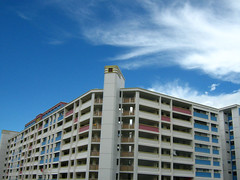Published a total of 21 songs for 2007.
Five of the songs were composed because of the Songcraft Songwriting Circle (including adaptations of original compositions by some of the Songcrafters). I'm usually inspired to compose something after each meetup.
 Nine of them for the collaborative music album with Adrian.
Nine of them for the collaborative music album with Adrian.It all started with this song (thanks dude, 'cos I really enjoyed putting the album together).
And we've decided to seal the partnership by giving ourselves a band name.
Enjoy the songs!

Ivan Chew's 2007 Discography :: Incidental Tunes of a Rambling Singaporean
- Walking On Air (Music Video Version) | Download
- We Stand Unbroken (2007) | Download
- Sea Biscuit Redux - Tears Came To My Eye (2007) | Download
- Home Again (2007) | Download
- Happiness Is (2007) | Download
- Seashore Days (Music Mash-up) | Download
- At My Window (cover version) | Download
- At My Window (Rock cover version) | Download
- Once Upon A Star | Download
- Love On A Train | Download
- Midnight Runner | Download
- Birthday Song - Library@Orchard | Download
- 真正的爱情 (True Love) | Download
SEASTARS 2007 :: The Album | Download the entire album here
- Seashore Days
- Once Upon A Star 1.3
- Flowing With The Waves 1.6
- Into The Deep 1.2
- Sea Anemone 2.1
- Stargazer 1.4
- Starfish 1.2
- Dolphins Galaxia 1.1
- Seabreeze 1.4
 This work by Ivan Chew is licensed under a Creative Commons Attribution-Noncommercial-Share Alike 3.0 License. For permissions beyond the scope of this license , please contact via RamblingLibrarian@gmail.com.
This work by Ivan Chew is licensed under a Creative Commons Attribution-Noncommercial-Share Alike 3.0 License. For permissions beyond the scope of this license , please contact via RamblingLibrarian@gmail.com.RamblingLibrarian's Podcasts:























